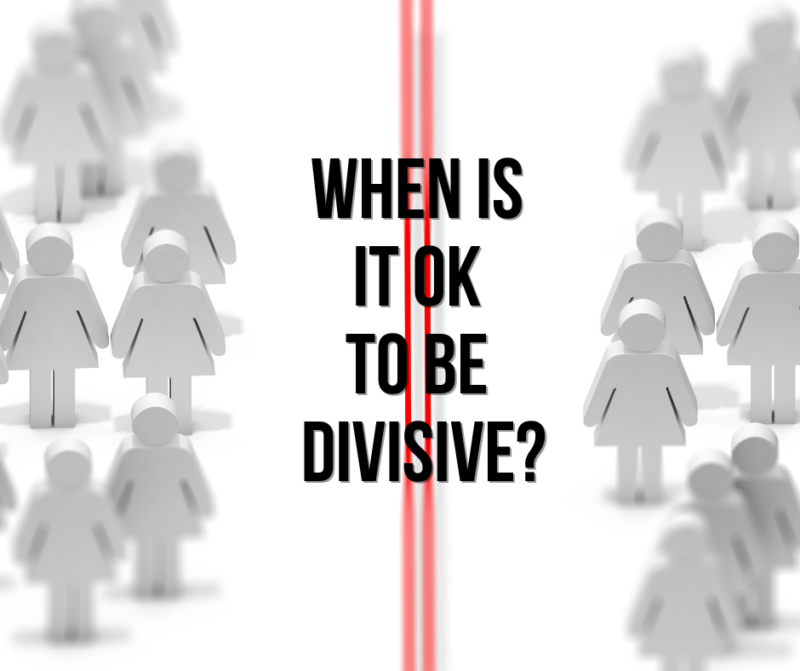If you have ever publicly taught Free Grace theology, at any level, you have almost certainly been accused of being a divisive person. The accusation can come in different ways. Some will point out that you hold to a minority view. The majority cannot be wrong. Others will say that good people differ with you. A common accusation is that FG teachings are offensive to people. Many will reject them because their families and dear friends, some of whom are dead, did not believe it, and they were godly people. I think most people think that you can believe FG stuff, but don’t push it. It will only result in arguments and the loss of fellowship. It is better to be inclusive about such issues. We should all just get along.
Occasionally, I have heard people use Titus 3:10 to support this way of looking at things. Paul writes: “Reject a divisive man after the first and second admonition.” He goes on to say that such a man is “warped and sinning.” Those are strong words indeed! If we stand up for the gospel of grace and the assurance of salvation by faith in Christ alone, are we being divisive? Are we warped people (whatever that means!)?
First, we must admit that if we teach that there is only one gospel, we are by definition divisive. There are a lot of gospels out there. Some teach that you must do good works to obtain eternal life. Others say you can lose it if you don’t keep doing good works. Others say you must be baptized or speak in tongues to be saved. Many say that you cannot know you have eternal life until the end of your life, or until you stand before the Lord. Free Grace proponents maintain that works play no role in obtaining, proving, or keeping eternal life. We know we have eternal life at the moment we believe in Jesus for it. That is altogether different. If we teach FG doctrine, it will be divisive.
Is that what Paul means by a divisive, warped, and sinning person? No. If we look at the context, Paul is not talking about people who have different views of how a person is eternally saved. He is not talking about fundamental Christian doctrines. In the previous verse, he lists things that make a person divisive. He says believers should avoid “foolish disputes, genealogies, contentions, and strivings about the law.” With the mention of the “law,” it is clear that Paul is referring to Jewish teachers who want to emphasize the OT Law. This is even more clear when he speaks of those in the churches who belong to the “circumcision,” who want to talk about “Jewish fables,” and argue about the “commandments of men.” This last phrase reminds us of the Pharisees, who constantly argued about their legalistic traditions that dealt with things such as how a person washes their hands, what food to eat, and how to wear clothes.
Paul tells Titus that there were believers in the church who were doing that. They argued about things that were foolish. They wanted to go back to the OT Law, figure out what food they could eat, what they could do on the Sabbath, and the importance of circumcision. It is hard to determine how they used genealogies for these purposes. Maybe they did so in order to show that they were descended from important Jewish sages of the past. This would be a way to make themselves superior to others. All these practices could only produce division among believers who did not agree on such unimportant things. Such issues have nothing to do with cardinal Biblical teachings such as how a person receives eternal life and the wonderful truth of the assurance of salvation.
When it came to these fundamental truths, Paul was more than willing to be divisive. When confronted by people in the church who promoted another gospel—a gospel of works—he did not mince words. His strongest words in all his epistles are directed towards them as he publicly rebukes them (Gal 1:6-9).
In Titus, Paul is not dealing with such fundamental issues. Some people in the church wanted to argue over things like food, ancestors, what kind of fabric one should wear, and issues that the Scriptures do not address. It would be like people wanting to argue today over whether pierced ears are sinful or if a guitar and drums can be played in church.
In a movie, an actor famously said to a woman who was irritating him: “Go sell crazy somewhere else.” Paul tells Titus to say that to people in the church who want to fight over silly things about which believers can disagree. The message is that we need to keep our craziness to ourselves. Don’t judge others who don’t share your craziness.
Let’s save our fighting for important things, like the free offer of eternal life by faith in Christ alone and assurance. Those things are worth being divisive over.


